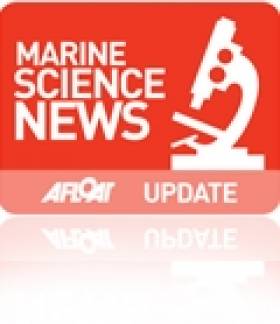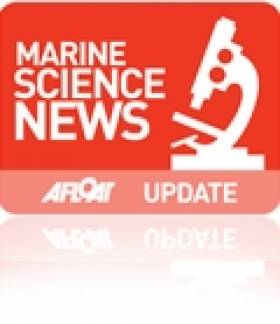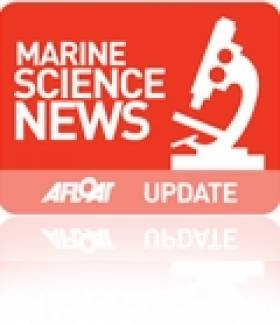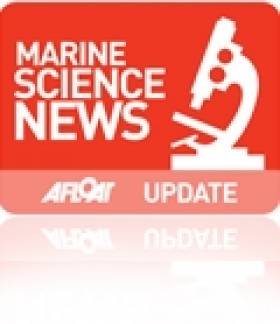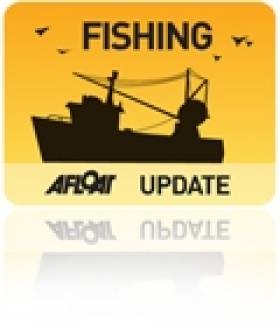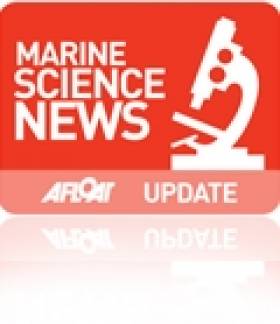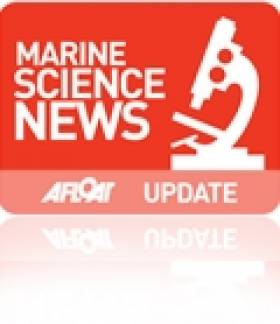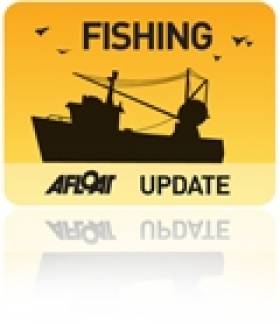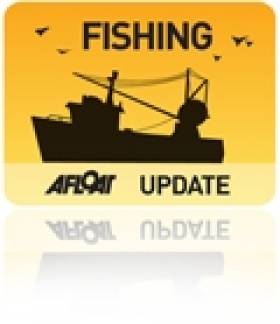Displaying items by tag: Marine Institute
INFOMAR Maps Out Proposed Operations for 2013
#INFOMAR – The Integrated Mapping for the Sustainable Development of Ireland's Marine Resource, in short (INFOMAR) have outlined their proposed mapping operations for 2013.
INFOMAR (covering 125,000 sq kms) is a joint venture between the Geological Survey of Ireland (GSI) and the Marine Institute.
During the current year of INFOMAR Phase 1 (2006-2016), operations are provisionally planned to take place within tabulated bays subject to approval from other agencies.
To see a map of proposed working area and more, Inshore Ireland (February / March) issue has a report.
As previously reported on Afloat.ie, the GSI's survey vessel RV Keary last month returned to service, having completed modifications carried out at Arklow Marine Services. The 15m aluminium catamaran research vessel was built in South Africa and is equipped with a full geographical suite.
Galway Hosts Shellfish Safety Science Workshop
#MarineScience - The 10th Shellfish Safety Science workshop will take place at the Marine Institute in Galway on Thursday 18 April 2013.
This one-day event is an opportunity for anyone working in the area of shellfish safety, including regulators, scientists as well as industry, to meet and exchange information on the latest advances in the field.
Irish regulatory agencies will provide updates on recent shellfish biotoxin, toxin-producing algae, harmful algal blooms and shellfish microbiology.
There will be presentations from research projects that are nearing completion on the toxicology and causative organism responsible for Azaspiracid shellfish poisoning which caused extensive economic hardship in 2012 and 2013.
A new EU project using advanced satellite imagery, mathematical modelling and real-time monitoring to provide short-term predictions will be demonstrated, showing how this multidisciplinary approach may provide useful information on biotoxin outbreaks for shellfish producers.
On the microbiological side, presentations on shellfish contamination from Norovirus and how the Shellfish Waters Directive aims to monitor and improve environmental conditions for shellfish cultivation will be given.
Further information on these and other aspects of the workshop are available on the Marine Institute website at www.marine.ie. Attendance is free but registration is required by emailing [email protected].
Scientific ‘Explorer’ Makes a Fleeting Call to Dublin Port
#IrishSeaSurvey – The Marine Institute's Galway based RV Celtic Explorer made a brief call yesterday to Dublin Port, while in between carrying out separate scientific surveys, writes Jehan Ashmore.
The 65m vessel, which is not a regular visitor to the port, had berthed at Ocean Pier. According to the Marine Institute's vessel survey schedule, she was conducting a Methane-derived Authigenic Carbonate (MDAC) survey headed by chief scientist Dr. Yvonne Leahy of the institute.
The survey was to complete a drop camera survey of a MDAC site in the Irish Sea, some 25 nautical miles offshore of Dublin Bay.
Celtic Explorer which is 2,425 tonnes and has a total of 35 personnel, and equally the same number of days in endurance range. Accommodation is for 22-30 scientists, 13-15 crew (dependent to operational requirements). Scientific quarters are for 4 single cabins and 9 double en-suite cabins.
Her inshore fleetmate, the 31m RV Celtic Voyager of 340 tonnes has an endurance capability of 14 days. A total of 15 personel made up of 8 scientists and 7 crew are accommodated in 4-berth quarters.
Live Online Updates From Irish Weather Buoy Network
#MarineInstitute - Keep track on the status of Ireland's coastal waters thanks to the Marine Institute's website, which features live updates from the Irish Marine Weather Buoy Network.
The network is a joint project designed to improve weather forecasts and safety at sea around Ireland. The buoy network provides vital data for weather forecasts, shipping bulletins, gale and swell warnings as well as data for general public information and research.
Data recorded by the six buoys dotted around Ireland's coastal waters, both offshore and far offshore, includes stats on atmospheric pressure, wind speed and direction, wave height and even salinity levels.
The project is the result of successful collaboration between the Marine Institute, the Department of Transport, Met Éireann and the UK Met Office.
IFI Welcomes New Research On Sea Lice and Wild Salmon
#FishFarm - Inland Fisheries Ireland has welcomed "a clear acceptance of the impact of sea lice on juvenile salmon" following a recent Marine Institute publication that identifies the effect of sea lice emanating from aquaculture facilities on wild Atlantic salmon mortality.
According to IFI, the paper published in the Journal of Fish Diseases "concurs with previously published international research" that it says establishes an incontrovertible link between fish farm developments and negative effects on local wild salmon numbers, as previously reported on Afloat.ie.
It adds that "the debate can now progress to identify the best methodologies to reduce or eliminate this impact" as well as moves on "the issue of escaped farmed salmon".
In a statement on the new paper, IFI says the research "identified that just under 40% of released juvenile salmon showed a significant difference in return rate between sea lice ‘treated’ and ‘non-treated’ groups, indicating that mortality from sea lice is significant in 40% of the releases in the study. Unfortunately, there was a significant effect from sea lice in six different bays along the west coast over the study period.
"This recent study provides further evidence that salmon will be impacted by sea lice. The location of salmon farms in relation to salmon rivers and the control of sea lice prior to and during juveniles salmon migration to their high seas feeding ground is critical if wild salmon stocks are not to be impacted.
"The development of resistance to chemical treatment of sea lice and other fish husbandry problems, such as pancreas disease and amoebic gill disease, are likely to make effective sea lice control even more difficult in future years."
IFI also highlights the Norwegian government's concerns about the impact of sea lice and escaped farm salmon on wild salmon stocks.
The statutory body for the protection and conservation for Ireland's inland fisheries reiterated its support for "the development of a sustainable aquaculture industry" to "safeguard wild salmon and sea trout stocks into the future".
It adds that recommendations on the above issues have been made in its submission to the Department of the Marine on the Environmental Impact Statement regarding the proposed deep-sea organic salmon farm in Galway Bay, a scheme that has been the subject of controversy over recent months.
Irish Marine Science Research Boosted By Two Major Funding Awards
#marinescience – The Minister for Jobs, Enterprise and Innovation, Richard Bruton TD and the Minister for Research and Innovation, Sean Sherlock TD, today (Friday 25th January 2013) announced funding totalling €60 million dedicated to 85 pioneering research initiatives. These awards administered via Science Foundation Ireland's (SFI) Investigator Programme included two major awards supporting Irish marine science research.
Speaking of the announcement of the SFI Investigator Awards, Minister for Research and Innovation Sean Sherlock said, "over the past decade, Ireland has invested heavily in R&D and the rewards are clearly visible. What is particularly heartening about today's announcement is that much of this excellent research, which was selected competitively following international peer review is being done in collaboration with companies who are seeking to find new products and services, including IBM Ireland, Intel Ireland, HP, EMC and Bord Gáis."
On behalf of the Marine Institute, Dr Heffernan, CEO of the Marine Institute congratulated Dr Dagmar Stengel of the National University of Ireland, Galway and Dr Jens Carlsson of University College, Cork for their excellent performance in securing research funds from this highly competitive SFI scheme.
"The two marine based projects listed in the SFI Investigator awards are a recognition of the internationally ranked quality of these Irish marine research scientists and the relevance of their work to Irish industry. These projects are particularly relevant to those firms which seek to develop value-added products based on marine biological resources and are a boost for Ireland's marine research community," said Dr Heffernan.
Dr Heffernan also highlighted the significance of what these awards mean to Ireland's Integrated Marine Plan, Harnessing Our Ocean Wealth stating "each project will deliver new knowledge that supports the plan's goals for a thriving maritime economy and healthy ecosystems."
Both researchers had previously been funded by the Marine Institute. Dr Jens Carlsson worked within the Fish Population Genetics project supported by the Beaufort Marine Science Awards. A project led by Dr Stengel, Phlorotannins in Irish Brown Seaweed - Investigations of their UV protective - Effects and Potential as Natural Sunscreens was funded under the NDP awards 2000-2006. Dr Stengel is currently a Principal Investigator on the MI/DAFM co-funded NutraMara marine functional foods project.
The SFI award to Dr Carlsson of €194,498 will support the project, Taxonomy and connectivity of animal species at the Moytirra hydrothermal vent field: developing methods for assessing ecological impacts of mineral extraction in the deep-sea. This award builds on the expedition held on the RV Celtic Explorer, which was funded by the Marine Institute and lead by University College, Cork that discovered the Moytirra hydrothermal vent field in July 2011.
Dr Stengel received an award of €244,782 to support her project, Iodine in commercially valuable Irish seaweeds: variability, pathways, and implications for industrial applications.
Marine Institute Invites Applications for Summer Work Placements
#MarineScience - The Marine Institute is inviting students to apply for a number of work experience placements in many exciting areas for this summer 2013.
The list and short description of the positions (available in a Word doc HERE) include 26 placements for 15 work titles.
The bursaries are worth €2,200 each for an eight-week placement based in various locations including the Marine Institute in Oranmore, Co Galway; Newport, Co Mayo; Harcourt Street in Dublin; and ports around the country.
The Marine Institute’s Bursary Programme provides valuable practical experience for budding marine scientists in areas of research such as marine fisheries, salmon management, aquaculture, environment, communications and the library.
The Bursary Programme is aimed at undergraduates of universities, institutes of technology and national institutes for higher education. The scheme is strictly limited to undergraduates who have completed two years' study in a relevant discipline.
Previous bursars have gone on to work in the Marine Institute (including two directors of the institute), Bord Iascaigh Mhara (BIM), regional fisheries boards, county councils, pharmaceutical companies and State laboratories, with some going as far afield as the EPA in Sydney, Australia and some now running their own companies.
To apply for the Summer Bursary Programme:
- Please check out the 15 bursary titles on offer (via the link above)
- Select the two bursaries that interest you most and in order of preference
- Complete the Marine Institute Bursary Application Form 2013 and return it FAO Annette Jordan, Marine Institute, Furnace, Newport, Co Mayo
The deadline for receipt of applications is 8 February 2013.
Opportunity For a Director With The Marine Institute
#Jobs - The Marine Institute is seeking applicants for the position of Director of Marine Environment & Food Safety Services.
The director will lead an experienced team responsible for the delivery of a number of critical functions in support of seafood safety, fish health and the protection of the marine environment.
The successful candidate will work closely with Government departments, external parties and key stakeholders in the effective management of scientific services and provision of policy advice.
The director will also provide strategic direction in the targeting and management of competitive research projects funded nationally and internationally.
Candidates will have successfully managed programmes, people and resources at a senior and strategic level. You will be able to demonstrate relevant experience and qualifications as detailed in the job specification to include a primary degree complemented by at least seven years post-qualification work experience.
A detailed job description can be found at the Marine Institute website HERE. The closing date for receipt of applications is 5.30pm on Tuesday 5 February 2013.
The Marine Institute is an equal opportunities employer.
Sustainability of Fish Stocks Improving Says Minister
#Fishing - Dr Peter Heffernan, CEO of the Marine Institute, presented the Minister for the Marine Simon Coveney with The 2012 Stock Book ahead of the EU Fisheries Council negotiations next week, noting an improvement in certain fish stocks with a higher number of stocks sustainably fished in 2012 compared with 2011 - as Tom McSweeney writes about in his column last Friday.
The Stock Book gives an overview of 59 stocks from which Ireland has an EU quota allocation and will be used to inform discussions and decisions on Total Allowable Catches (TACs) fishing quotas for 2013. TACs and quotas will be decided at the December EU Fisheries Council on 18-20 December which will be attended by the minister, who has lately faced criticism over the proposed deep-sea salmon farm in Galway Bay.
Minister Coveney said: "I welcome the comprehensive review carried out by the Marine Institute showing the state of fish stocks that are of importance to Ireland. Of the 59 stocks in which Ireland has a share of the EU TAC, 42% are now fished sustainably compared to 36% in 2011. The state of the resource base in terms of the biomass, the population of mature fish in the stock, has also improved. The number of depleted stocks has declined from 12 to 8.
"It is good to see progress on delivering sustainable fishing. Further efforts are needed both in terms of setting TAC levels and also taking other measures such as reducing catches of juvenile fish and dealing with unacceptable levels of discards.
He added: "Having the latest scientific information at my fingertips is essential at the December council. My approach to the negotiations will be to utilise this science to ensure EU fishing policy secures the long term sustainability of the industry.
"The December Council negotiations must concentrate on achieving a more practical and pragmatic regime for the fishing industry, grounded in the scientific data available in the Stock Book.”
The Stock Book advice is developed using the latest available research, assessments and advice on the fisheries resource. Irish scientists collaborate with other international scientists at the International Council for the Exploration of the Seas (ICES).
“ICES is a key forum for Ireland where our scientists develop impartial scientific advice that meets best international standards,” said Dr Heffernan.
The Stock Book is presented annually to Department of Agriculture, Food and the Marine. The information is of vital importance in serving Ireland during the annual TAC negotiations at the various EU Council of Fisheries meetings, but principally at the December council meeting where the quotas for the following year are set.
It is also of interest to a wider audience, including the fishing industry, marine scientists, managers, environmental NGOs, third level institutes, financial institutions and those with an interest in the status and management of marine fisheries resources in the waters around Ireland.
The Stock Book has been published by the Marine Institute since 1993 and has evolved considerably in that time period. It continues to evolve in a changing fisheries advisory environment. The Stock Book is available electronically on the Marine Institute’s website HERE.
Unfishable Areas May Be Refuge for Endangered Flapper Skate
#FISHING - Marine scientists working in the Celtic Sea have discovered a natural refuge for the critically endangered flapper skate.
Many elasmobranchs (sharks, rays and skates) are highly vulnerable to over-fishing, but a new paper in the open access journal PLOS ONE shows that small areas of the seabed that experience below-average fishing intensity can sustain greater populations of these species.
The study reveals that one remarkable area in the northeastern Celtic Sea - where uneven seabed makes trawling difficult - supports at least ten species of elasmobranch, including the rare blue skate (Dipturus flossada) and related flapper skate (Dipturus intermedia).
Dipturus was previously considered to represent a single species (D. batis), but made the news in 2009 when a case of misidentification was revealed.
Both species are now listed as critically endangered but populations of the flapper skate, which can grow up to 2.5 metres in length, are considered to be under greatest threat from extinction.
European Union regulations mandate that fishermen throw back any flapper skate but its slow growth and reproduction mean that even very low levels of fishing mortality are now unsustainable for this species.
Scientists from Queen’s University Belfast, Bangor University and the Marine Institute carried out the study. Lead researcher Dr Samuel Shephard suggests that “the discovery of a Celtic Sea stronghold for flapper skate provides a remarkable opportunity to help save a species on the verge of extinction”.
Professor Michel Kaiser, chair in marine conservation at Bangor University, added: “Some have previously argued that areas of little interest to the fishing industry are not worthy of conservation, however this study clearly overturns that perception and highlights just how important some of these areas are."
Importantly, the fishing industry has reacted positively to the ‘win-win’ situation that an area of little commercial interest has potential as an important marine reserve.
Professor Dave Reid of the Marine Institute presented the information to industry leaders, and this has led to the inclusion of the area in proposed management plans for elasmobranchs in the Irish and Celtic Seas.
Eibhlín O’Sullivan, CEO of the Irish South & West Fishermen’s Organisation, responded that the Irish fishing industry "has been working with the Marine Institute for the past 18 months on developing a management plan for skates and rays. This new research adds valuable information for the identification of potential seasonally closed areas."
Prof Reid noted that “this is a great model for collaboration on conservation between the fishing industry and scientists”.
The research leading to these results has received funding from the European Community's Seventh Framework Programme (FP7/2007-2013).


























